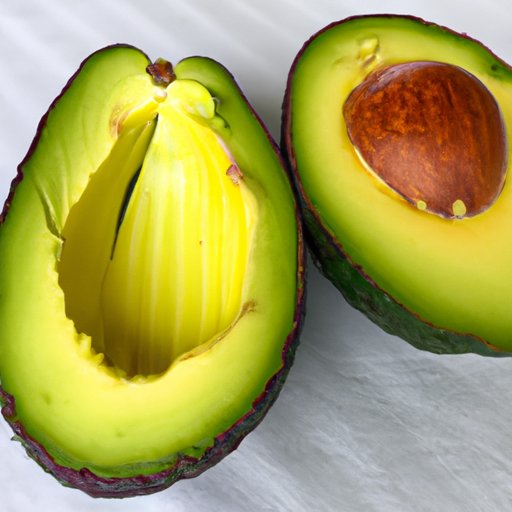Introduction
Avocados have become one of the most popular fruits in recent years. It’s no surprise considering the long list of health benefits associated with them. But what exactly makes avocados so healthy? In this article, we’ll take a closer look at the nutritional profile of this versatile fruit, examine the health claims associated with it, compare it to other fruits, and investigate the effects of eating it regularly.
What is an Avocado?
Avocado (Persea americana) is a tree native to Central America and Mexico. It’s also known as an alligator pear or butter fruit, due to its buttery texture and pear-like shape. Avocados are a nutrient-dense food, meaning they provide a substantial amount of vitamins, minerals, and other beneficial compounds per calorie. They’re also high in fiber, making them a great addition to any diet.
Overview of the Health Benefits and Claims
Avocados are often referred to as a “superfood” due to their impressive nutrient content and potential health benefits. They are packed with vitamins and minerals, and contain healthy fats, antioxidants, and dietary fiber. Studies suggest that consuming avocados may help lower cholesterol levels, reduce blood pressure, aid in weight loss, and improve diabetes management.

Examining the Nutritional Benefits of Avocado
Avocados are a good source of many essential nutrients, including:
Vitamins and Minerals
Avocados are an excellent source of vitamin K, folate, and vitamin C. They also contain significant amounts of potassium, magnesium, and vitamin E. A single avocado contains approximately 20% of the recommended daily intake (RDI) of these vitamins and minerals.
Antioxidants
Avocados are rich in antioxidants, which are compounds that protect cells from damage caused by free radicals. The most abundant antioxidant in avocados is lutein, which is important for eye health. Other antioxidants present in avocados include zeaxanthin, alpha-carotene, and beta-carotene.
Healthy Fats
Avocados are high in monounsaturated fatty acids, which are considered “good” fats because they can help lower bad cholesterol levels and reduce the risk of heart disease. Additionally, avocados contain oleic acid, which has been linked to reduced inflammation.

Exploring the Health Claims Around Avocado
Avocados are often touted as a “miracle” food due to the numerous health benefits associated with them. Let’s take a closer look at some of the most common claims.
Heart Health Benefits
Avocados are high in monounsaturated fat, which has been shown to help lower LDL (“bad”) cholesterol levels. Additionally, research suggests that the antioxidants found in avocados may help reduce inflammation, which can lead to a decrease in heart disease risk. A study published in the journal Nutrition Reviews found that consuming avocados was associated with a decrease in blood pressure and improved lipid profiles.
Weight Loss Benefits
Avocados are low in calories and high in fiber, making them a great choice for those looking to lose weight. Studies have found that consuming avocados can help increase feelings of fullness and reduce hunger, leading to a decrease in overall calorie intake. Additionally, avocados contain monounsaturated fats, which can help promote weight loss.
Diabetes Management
Avocados are a great food for those with diabetes. They contain healthy fats, fiber, and antioxidants, all of which can help regulate blood sugar levels. Additionally, avocados are low on the glycemic index, meaning they won’t cause a sudden spike in blood sugar levels. A study published in the journal Nutrition Research found that consuming avocados regularly was associated with improved blood sugar control in people with type 2 diabetes.

Comparing Avocado to Other Fruits
When it comes to nutrition, avocados are often compared to other fruits. Let’s take a look at how they stack up.
Calories
Avocados are relatively high in calories compared to other fruits. One medium avocado contains approximately 322 calories, while a medium apple contains 95 calories and a medium banana contains 105 calories.
Macronutrients
Avocados are a good source of healthy fats, containing approximately 29 grams per medium fruit. They are also high in carbohydrates, with 17 grams per serving. By comparison, apples contain 10 grams of carbs and bananas contain 27 grams.
Dietary Fiber
Avocados are a great source of dietary fiber, with 11 grams per medium fruit. Apples contain 4 grams per serving, while bananas contain 3 grams.
Investigating the Effects of Eating Avocado Regularly
In addition to the vitamins and minerals mentioned above, consuming avocados regularly may offer other health benefits. Let’s take a closer look at some of the potential effects.
Impact on Blood Sugar Levels
Avocados are low on the glycemic index, meaning they won’t cause a sudden spike in blood sugar levels. Additionally, studies have found that consuming avocados regularly can help improve insulin sensitivity, which is important for managing diabetes.
Improved Digestion
Avocados are high in fiber, which can help promote regularity and improve digestive health. A study published in the journal Nutrition Research found that consuming avocados was associated with increased stool frequency and improved bowel function.
Reduced Inflammation
The healthy fats found in avocados may help reduce inflammation in the body. A study published in the journal Nutrients found that consuming avocados regularly was associated with decreased levels of inflammatory markers in the blood.
Looking at Avocado’s Impact on Cholesterol Levels
Avocados are a great source of monounsaturated fat, which can help reduce bad cholesterol levels and improve heart health. A study published in the journal Metabolism found that consuming avocados regularly was associated with lower LDL (“bad”) cholesterol levels and higher HDL (“good”) cholesterol levels.
Monounsaturated Fat Content
Avocados are a good source of monounsaturated fat, which can help reduce bad cholesterol levels and improve heart health. Studies have found that consuming avocados regularly can help reduce LDL cholesterol levels and increase HDL cholesterol levels.
Lower LDL Levels
Studies have found that consuming avocados regularly can help lower LDL (“bad”) cholesterol levels. A study published in the journal Metabolism found that consuming avocados was associated with a decrease in LDL cholesterol levels.
Assessing the Pros and Cons of Including Avocado in a Diet
Avocados are a nutritious and versatile food that can be included in a variety of dishes. However, it’s important to consider the pros and cons before adding them to your diet.
Pros
Avocados are a good source of many essential nutrients, including vitamins, minerals, antioxidants, and healthy fats. They are also low in calories and high in dietary fiber, making them a great choice for those looking to lose weight. Additionally, studies suggest that consuming avocados may help lower cholesterol levels, reduce blood pressure, and improve diabetes management.
Cons
Avocados are relatively high in calories and fat, so it’s important to keep portions in check. Additionally, due to their high fat content, avocados can go bad quickly if not stored properly. Finally, some people may be allergic to avocados, so it’s important to watch for any signs of an allergic reaction.
Conclusion
Avocados are a nutrient-dense food that can offer a variety of health benefits. They are packed with vitamins and minerals, antioxidants, and healthy fats. Additionally, studies suggest that consuming avocados may help lower cholesterol levels, reduce blood pressure, aid in weight loss, and improve diabetes management. While it’s important to keep portions in check due to their high fat content, including avocados in your diet can help you reap the benefits of this versatile and nutritious fruit.
(Note: Is this article not meeting your expectations? Do you have knowledge or insights to share? Unlock new opportunities and expand your reach by joining our authors team. Click Registration to join us and share your expertise with our readers.)
